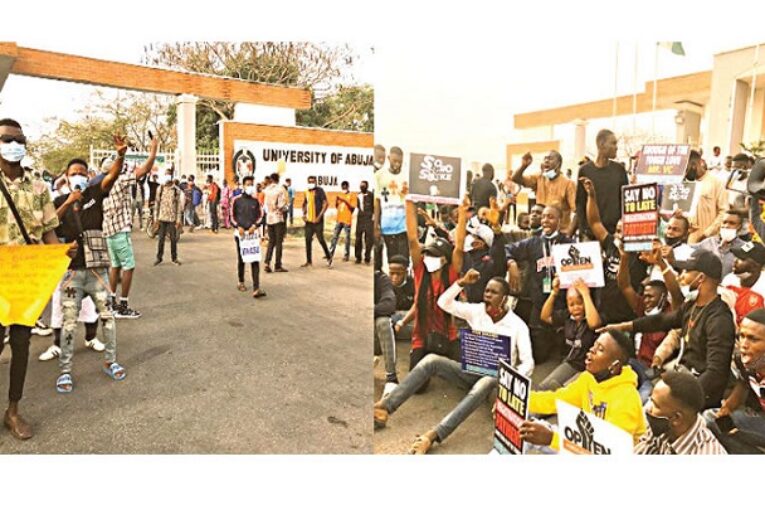
A 300-level student of History and International Studies at the University of Ilorin, Kwara State, Jamiu Opeyemi, has been struggling for many years to sponsor himself in school.
He had been paying his school fees by himself from the proceeds from selling pepper and tomatoes, assisting colleagues with assignments, engaging in mobile data sales, and doing PoS business.
He told Sunday PUNCH that he was devastated when he logged into his school’s portal to discover that the N26,000 tuition fee had increased to N50,000.
Opeyemi told our correspondent that it was tough paying N26,000 and afraid of how to raise the new N50,000 tuition fee.
He said that upon discovery of the increment, he sent a message to the student union president asking what would be done but he told him to hold on for about 72 hours after which he could proceed with payment.
He added, “From my findings, I discovered that the president wasn’t present at the committee meeting where the increment was deliberated upon. The school fees were increased and only communicated to him.”
Opeyemi said the student representative, himself and other students were helpless, hence the directive to proceed with payment. He said that he planned to spend approximately N30,000 for his fees but had no option than to reach out to his benefactor for the balance.
He said, “When I ran out of options, I had to meet my benefactor to give me the balance to complete the payment. Before now, I paid between N26,000 to N29,000 depending on the time I register but now it’s between N50,550 to N51,550. There’s no form of empathy from my school, especially towards us who are indigent students.
“The increment has been made and the school has extended the deadline for payment twice. I was told there would be additional charges when next the portal is open for payment and that would be the last time. Apart from this, hostel accommodation and transport to campus are other issues. We are just struggling to survive.”
Season of protests
Undergraduates heaved a sigh of relief on October 18, 2022, when the eight-month-long strike embarked upon by the Academic Staff Union of Universities on February 14, 2022, came to an end. It was regarded as one of the longest in the history of ASUU strikes since 1999.
Surprisingly, when students were preparing to resume for a new session and began logging into their portals, they saw new increments in terms of tuition, registration fee among other fees. This prompted students of some varsities and polytechnics to embark on peaceful protests threatening imminent strikes if a reversal of the increments was not done.
Bearing placards with several inscriptions and chanting anti-government songs, the students of the University of Abuja, on January 9, converged on the school gate, requesting a reversal of the tuition hike.
During a similar protest at the University of Maiduguri, Borno State, on January 5, the National Vice President, Special Duties, National Association of Nigerian Students, Suleiman Sarki, said the tuition hike would increase the number of dropouts in the country due to inability to pay and force a huge number of Nigerian students into insurgency, banditry, and kidnapping.
“I, for example, paid N29,830 last year at the University of Maiduguri, but this year it has been increased to about N74,000. I don’t have the money to pay for this. I may have to quit my studies,” the NANS leader said.
At the University of Taraba, students took to the streets to protest the tuition hike. The students were surprised that amid the current economic hardship, some universities could come up with such a decision which they described as insensitive.
Also, students of The Polytechnic Ibadan, Oyo State, on January 9, a day their exams were to commence, protested the increase in their hostel refusal fee.
They blocked the school gate and Sango-Poly Junction causing gridlock after which they proceeded to the state’s secretariat. The fee which was previously not compulsory was made compulsory for those who lived off-campus.
One of the students, Feyisayo said, “We weren’t meant to pay the hostel refusal fee but the school authorities have now made it compulsory. Hostel accommodation is N30,000 but most of us don’t stay there because of the dilapidated condition. When they came up with the refusal fee, it was initially N5,000 then they increased it to N15,000. But after the protest, it was reduced to N5,000.”
Several other universities across the country including the University of Nigeria, Nsukka; Michael Okpara University, Umudike, Abia State and National Open Unibversity of Nigeria, Lagos State have protested against tuition hikes. Meanwhile, Nigerian students in the 19 northern states have also threatened to embark on protests following the recent increments in their fees in some universities in the region.
Before the protests
Shortly after the suspension of the strike by ASUU and demands by lecturers and other stakeholders for better funding of tertiary education in Nigeria, some federal universities across the country announced over 200 per cent hike in registration and tuition fees for students, citing the country’s economic situation and increase in the cost of providing services.
Some universities such as the Federal University Dutse, Jigawa State, offered payment in instalments and a discount for members of staff.
During the strike, some of the issues raised by the union bordered on the release of revitalisation funds for universities, and increment in the salaries and allowances of university lecturers.
Earlier, the President, Major General Muhammadu Buhari (retd) regime disclosed that it had disbursed over N1tn to the tertiary education sector.
Also, during the strike, a former Minister of State for Education, Chukwuemeka Nwajiuba, revealed plans for sustainable funding of the universities, including fee hike, but ASUU kicked against the proposal.
The face of Nigerian varsities
In the constitution, education is on the concurrent list, indicating that it’s run by both the state and federal governments.
According to the National Universities Commission, the country has 220 universities–50 federal, 59 states, and 111 private. Besides, the National Board for Technical Education accredits 165 polytechnics comprising 40 federal, 49 states, and 76 private.
According to United Nations Educational, Scientific, and Cultural Organisations, there are around 235 million students enrolled in universities around the world. Yet, despite the situation, the overall enrolment ratio is 40 per cent with large differences between countries and regions.
UNESCO’s mandate is in higher education and works with countries to ensure high-quality higher education opportunities are available to everyone. It places a special focus on inclusion, the recognition of qualifications, and quality assurance, particularly in developing countries.
This is why the body in the Education For All Report for 2000 to 2015 tagged, ‘The Dakar Framework for Action,’ called for a significant increase in the financial commitment by national governments and donors to the education sector to accelerate progress towards the EFA goals.
But reports show that the Federal Government barely allocated up to 15 per cent of its budget to education in the last six years.
In 2016, the Federal Government allocated N369.6bn which amounted to 6.7 per cent of the national budget of N6.06tn to education, while in 2017, N550.5bn; 7.38 per cent of the N7.29tn budget was allocated to the sector.
In 2018, N605.8bn, out of N9.12tn budget, representing 7.04 per cent was allocated to education; in 2019, it was N620.5bn, representing 7.05 per cent of the N 8.92tn budget. In 2020, N671.07bn of N10.33tn which amounted to 6.7 per cent was allocated to the sector; while in 2021 the sector got N742.5bn of N13.6tn budget, representing 5.6 per cent.
-Punch




